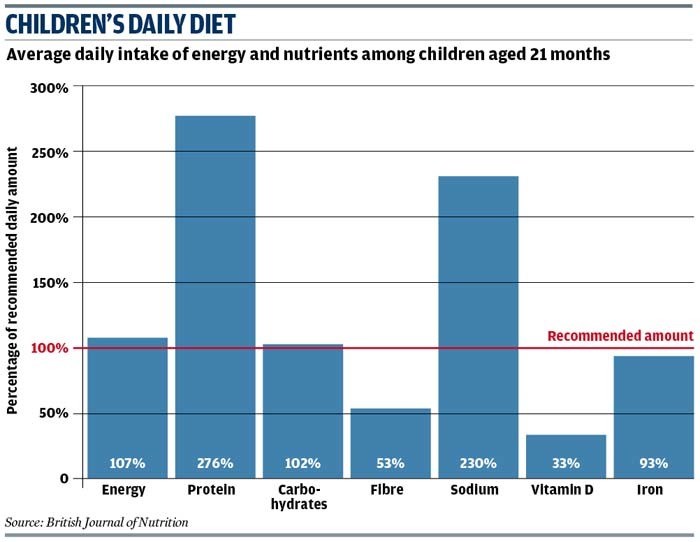Research Report: Energy and Nutrient Intakes of Young Children in the UK
Charlotte Goddard
Tuesday, May 24, 2016
Diet in the early years may have a lifetime impact on health, but there are few recent large-scale studies of the eating habits of UK toddlers. A team of researchers, led by Hayley Syrad of University College London's department of epidemiology and public health, set out to undertake a detailed analysis of the dietary intake of very young children when weaning was complete or close to completion.
Authors Hayley Syrad, Clare Llewellyn, Cornelia van Jaarsveld, Laura Johnson, Susan Jebb and Jane Wardle
Published by British Journal of Nutrition, April 2016
Energy and Nutrient Intakes of Young Children in the UK
SUMMARY
The researchers used data collected from 2,336 children who were part of the Gemini study, a sample of twins born in England and Wales between March and December 2007. Parents were asked to complete a food diary for their child over three days, including two weekdays and a weekend day. The researchers compared the data gathered with another sample of 386 children aged 18 to 36 months to make sure the diet of the Gemini sample reflected that of other UK toddlers.
The study found children’s diets were lacking in fibre, vitamin D and iron, and contain too much salt, which could lead to serious health problems in the future.
The average daily calorie intake of toddlers was seven per cent higher than recommended by public health nutrition guidelines. At the age of 21 months, 63 per cent of children exceeded the Scientific Advisory Committee on Nutrition’s recommended daily intake of 938 calories by 97 calories on average.
The average daily intake of 40g of protein was about three times higher than the recommended 15g for children aged one to three. Previous research has found links between excessive protein consumption and severe or morbid obesity in children.
Ninety-eight per cent of children were consuming too much salt. On average, children in the study were consuming nearly three times more sodium than the 0.5g recommended by the Department of Health.
The researchers said the total amount of salt in the diet of the children in the study is likely to be higher than indicated, as salt added during cooking and at the table is often under-reported. Children in the study were only consuming half the amount of recommended fibre, at 8g.
The government recommends all children aged between six months and five years should take a daily supplement containing vitamin D. Average vitamin D intake fell far short of the recommended seven micrograms at just 2.3 micrograms a day. Only seven per cent of children were consuming enough vitamin D.
Almost 70 per cent of children did not consume the recommended amount of iron – 6.9 micrograms a day. Even when children were taking supplements, 61 per cent failed to consume the recommended amount of iron. Inadequate intake of vitamin D and iron has been associated with poor health.

IMPLICATIONS FOR PRACTICE
The report authors say parents need more guidance on the appropriate type, amount and variety of food and drink to give young children. As the intake of many micronutrients, such as sodium, was higher than recommended, this should be monitored in the future as part of population risk assessment, they suggest. Guidance should also be available on how supplements could reduce obesity and other health problems. Although many milk and food products for young children are now fortified with iron, there is also a need to provide more guidance to parents on identifying other foods that are good natural sources of iron.
FURTHER READING
National Diet and Nutrition Survey: Results from Years 1–4 (Combined) of the Rolling Programme (2008/2009–2011/12), Beverley Bates and others, Department of Health and Food Standards Agency, May 2014. A survey of the eating habits of the UK population.
Diet in a Group Of 18-month-old Children in South West England, and Comparison with the Results of a National Survey, Imogen Cowin and Pauline Emmett, Journal of Human Nutrition and Dietetics, June 2007. An investigation into the normal range of nutrient intake and food consumption patterns in a sample of 1,026 toddlers.
Diet and Nutrition Survey of Infants and Young Children, Alison Lennox and others, Department of Health and Food Standards Agency, March 2013. A one-off survey collecting data on food and nutrient intake from 2,683 children aged between four months and 18 months.




